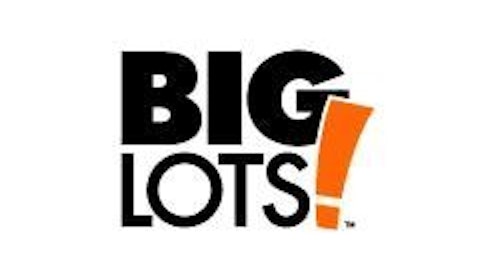
In the fiscal quarter ending in October- the third of Dollar Tree’s fiscal year- revenue rose 8% compared to the same period in the previous fiscal year. Comparable net sales were up 1.6%, as much of the company’s growth came from an increase in store count. Still, Dollar Tree reported a remarkable 49% increase in earnings; we would say that it’s able to control costs even as it opens more locations, and with margins actually increasing it doesn’t appear to have achieved maximum market penetration yet.
Dollar Tree, interestingly, is actually down 4% in the last year as sentiment towards dollar stores has cooled. It’s certainly possible that an increase in consumer confidence and spending will drive customers towards higher-priced retail, but the combination of growth and a falling stock price has left the stock at only 16 times trailing earnings. It wouldn’t take much more growth for the company to justify that figure, and Dollar Tree could certainly be a good value even if its net income begins growing much more slowly. In addition, as a dollar store Dollar Tree doesn’t care much about the state of the overall economy; its beta is 0.2. As a result investors would be somewhat protected from a downside surprise. Another interesting point is that one of the company’s Board members was buying the stock in mid November.
A number of other hedge funds saw an opportunity in Dollar Tree during the third quarter of 2012. Fellow Tiger Cub John Griffin’s Blue Ridge Capital increased its own stake by 21%, and closed September with 4.6 million shares in its portfolio (check out more stocks Griffin was buying). Renaissance Technologies, founded by billionaire Jim Simons, also added shares. Find more stock picks from Renaissance Technologies.
Dollar Tree was one of two dollar stores to make our list of the most popular retail stores among hedge funds for the third quarter (see the full rankings). The other was Dollar General, which actually won the #1 slot. Dollar General, which as we’ve noted was another Mandel pick, trades very similarly to Dollar Tree: its trailing P/E is just a bit higher at 17, and both companies are valued at 14 times forward earnings estimates. Dollar General also recorded close to 50% earnings growth in its most recent quarter versus a year earlier. It’s tough to pick between these two stocks given how similar they are.
Of course, there’s another self-proclaimed dollar store- Family Dollar Stores, Inc. (NYSE:FDO)– and hedge fund favorites Wal-Mart Stores, Inc. (NYSE:WMT) and Target Corporation (NYSE:TGT) are sources of competition as well. Family Dollar doesn’t seem like as good a deal as the companies we’ve previously discussed: its growth rates are lower and its trailing P/E is higher, at 20. Wal-Mart and Target are a slightly different class of retailer. They are, of course, considerably larger in terms of market cap; they are more closely tied to the economy, with betas in the 0.4-0.5 range; partly as a result of their larger size, their growth rates are lower but still quite respectable. With trailing P/E multiples in the 14-15 range (Target has a small discount) it’s possible that the dollar stores’ superior growth rates makes them better buys at their small premium to these more established retailers.
We can see why Lone Pine likes Dollar Tree. While there really isn’t much to distinguish it from Dollar General, these two companies are growing nicely and don’t look that expensive relative to the big boxes- and they’re certainly much better values than Amazon.com, Inc. (NASDAQ:AMZN). We’d be interested in examining those two dollar stores more closely.




